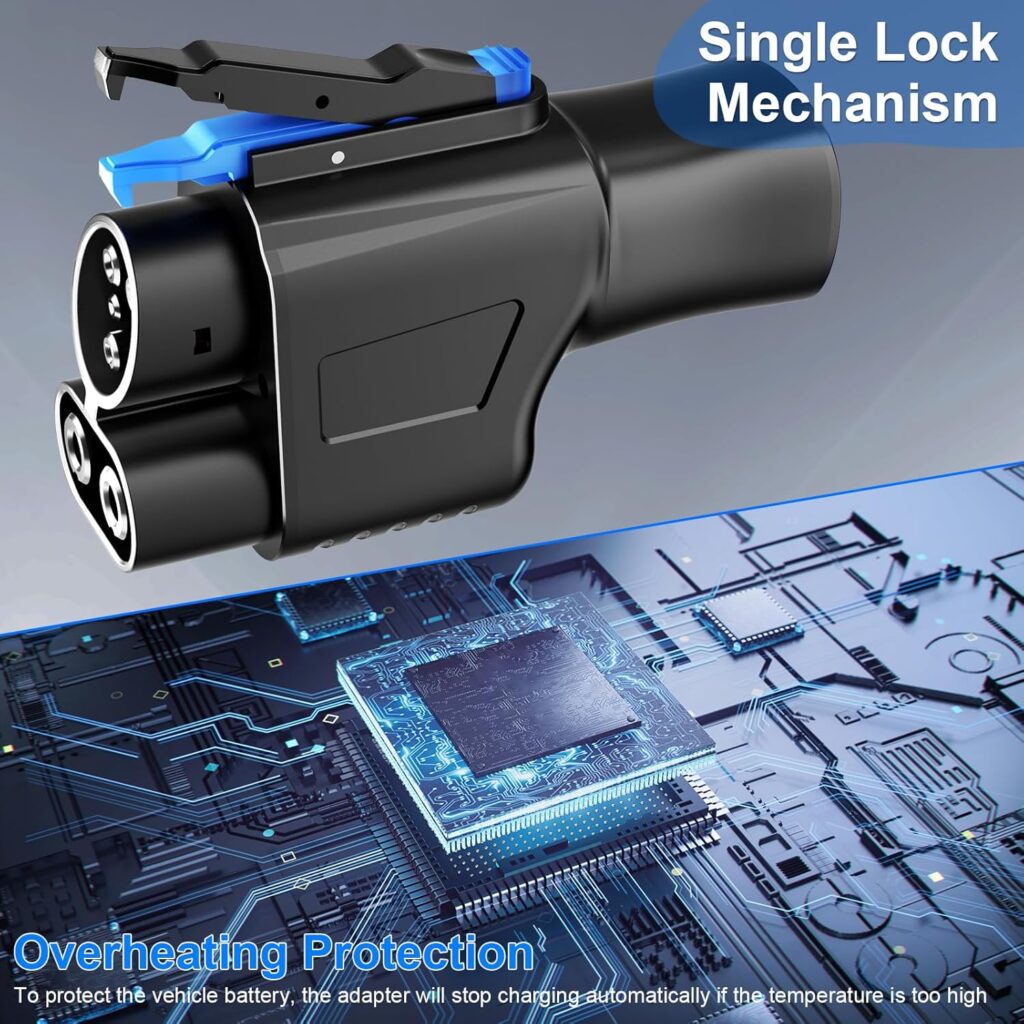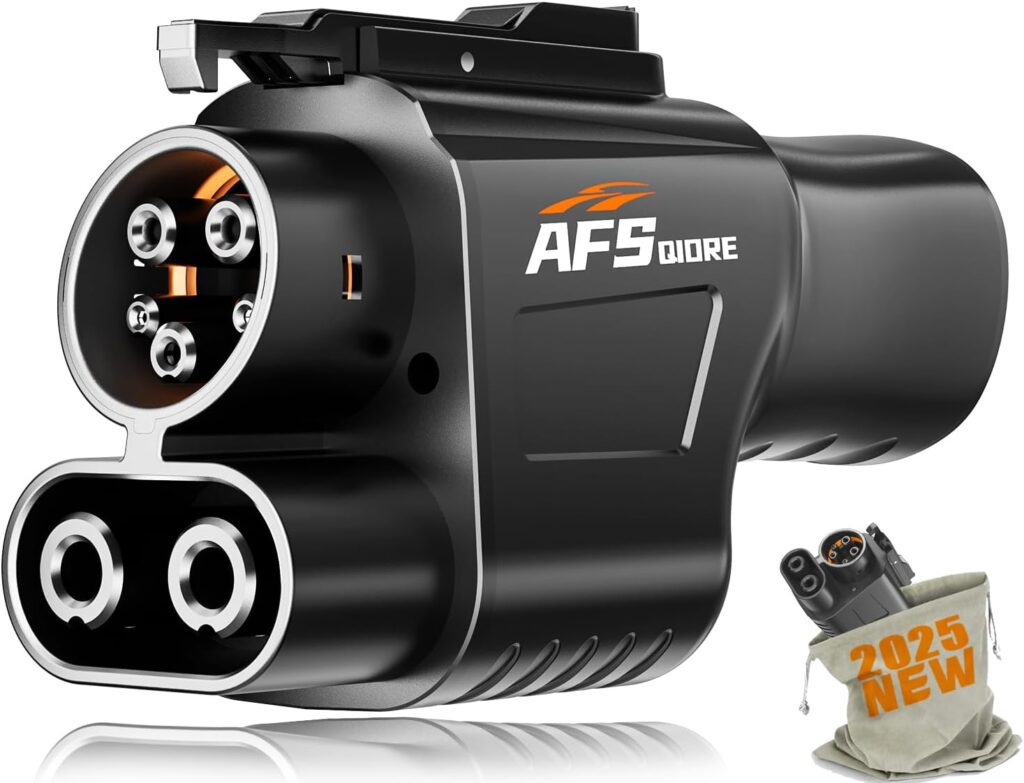Many of you face the challenge of navigating the complex world of electric vehicle charging standards. Your choice of charger can significantly impact your EV experience, with charging speeds ranging from 50KW to 250KW. As you explore the market, you’ll find that different manufacturers employ varying connector types, from CCS to NACS (formerly Tesla) standards. The compatibility landscape is rapidly evolving, with Tesla’s Supercharger network now becoming accessible to other brands through specialized adapters. You’ll need to consider factors like charging speed, safety features, and temperature management when selecting the right charging solution for your vehicle.
>>>>>Buy Now on Amazon for AFS QIORE NACS to CCS Adapter<<<<<
Disclaimer: As an Amazon Associate, I earn commission from qualifying purchases.
Understanding Charger Standards
While navigating the world of electric vehicle charging, you’ll encounter various charging standards designed to ensure compatibility and safety. These standards define how power is delivered to your vehicle, with NACS and CCS being the predominant protocols in modern charging infrastructure. Though seemingly complex, these standards are vital for maintaining consistent charging experiences across different vehicle brands.
Types of Universal Chargers
- NACS (North American Charging Standard)
- CCS (Combined Charging System)
- Fast DC Charging capability
- Adaptive Voltage Systems
Though compatibility varies by manufacturer, you’ll find these standards increasingly unified across platforms.
| Charger Type | Specifications |
|---|---|
| NACS | Up to 250kW charging |
| CCS Adapter | 160 miles in 14 minutes |
| Temperature Range | Up to 122°F |
| Safety Rating | IP65 waterproof |
| Warranty | 1-year replacement |
Key Specifications and Features
About the technical aspects, you’ll find these adapters equipped with dual-locking mechanisms and temperature control systems. Your charging experience is protected by multiple safety features, including automatic thermal shutdown and overcharge protection.
Considering your charging needs, you’ll appreciate that these adapters support charging rates up to 250kW, providing access to over 15,000 Tesla Supercharger stations. Your vehicle’s safety is ensured through CE, FCC, and RoHS certifications, with extensive durability testing exceeding 20,000 mating cycles.
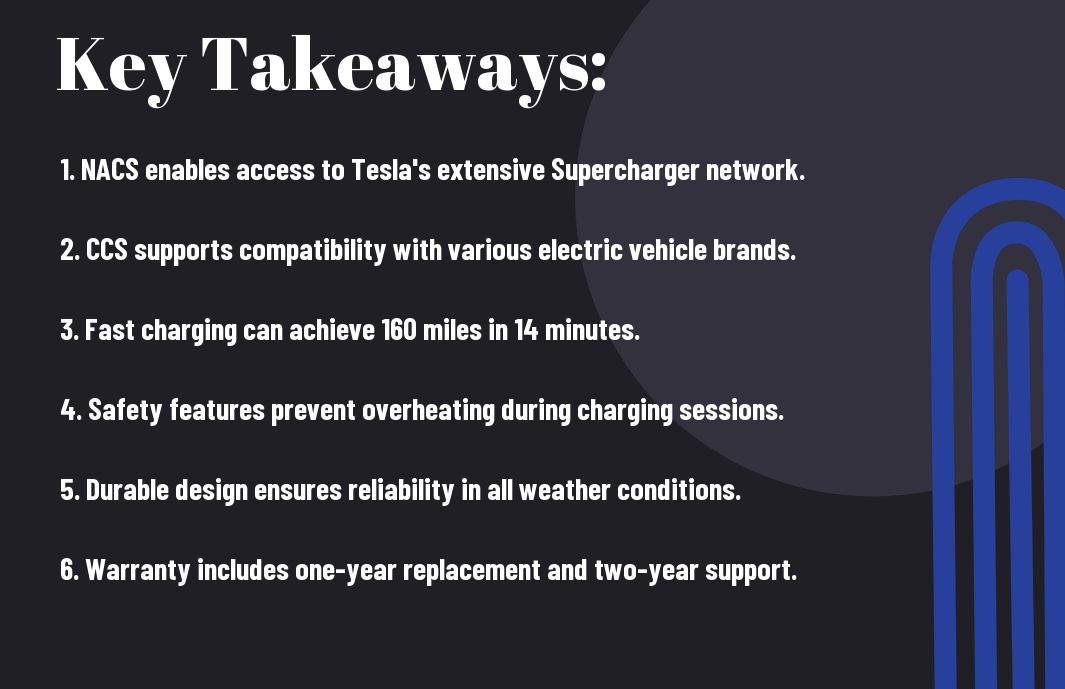
Comparison of Popular Charger Brands
The market offers you various EV charging solutions, with notable differences in compatibility, charging speeds, and safety features. Your choice significantly impacts your charging experience and vehicle performance.
| Charging Speed | Safety Features |
| Compatibility | Weather Resistance |
Brand A Overview and Features
Between the available options, Brand A stands out with its 250KW charging capability, offering you impressive charging speeds of 160 miles in 14 minutes. Your vehicle’s compatibility extends to Ford Electric & Hybrid Cars, Rivian Electric Vehicles, and GM Electric Vehicles.
Brand B Overview and Features
By selecting Brand B, you gain access to over 15,000+ Tesla Supercharger stations through its NACS to CCS adapter system. Your charging experience is enhanced with automatic temperature control and IP65 waterproof rating.
Further analysis reveals Brand B’s sophisticated safety mechanisms, including dual temperature sensors and a unique locking system. Your charging sessions are protected by CE, FCC, and RoHS certifications, with 20,000+ durability test cycles ensuring reliable performance in all weather conditions.
Charging Speed and Efficiency
Your charging experience depends significantly on the standard charger you choose. Modern chargers offer impressive charging speeds up to 250kW, allowing you to add substantial range in minimal time. The efficiency of these systems has evolved to minimize energy loss during the charging process.
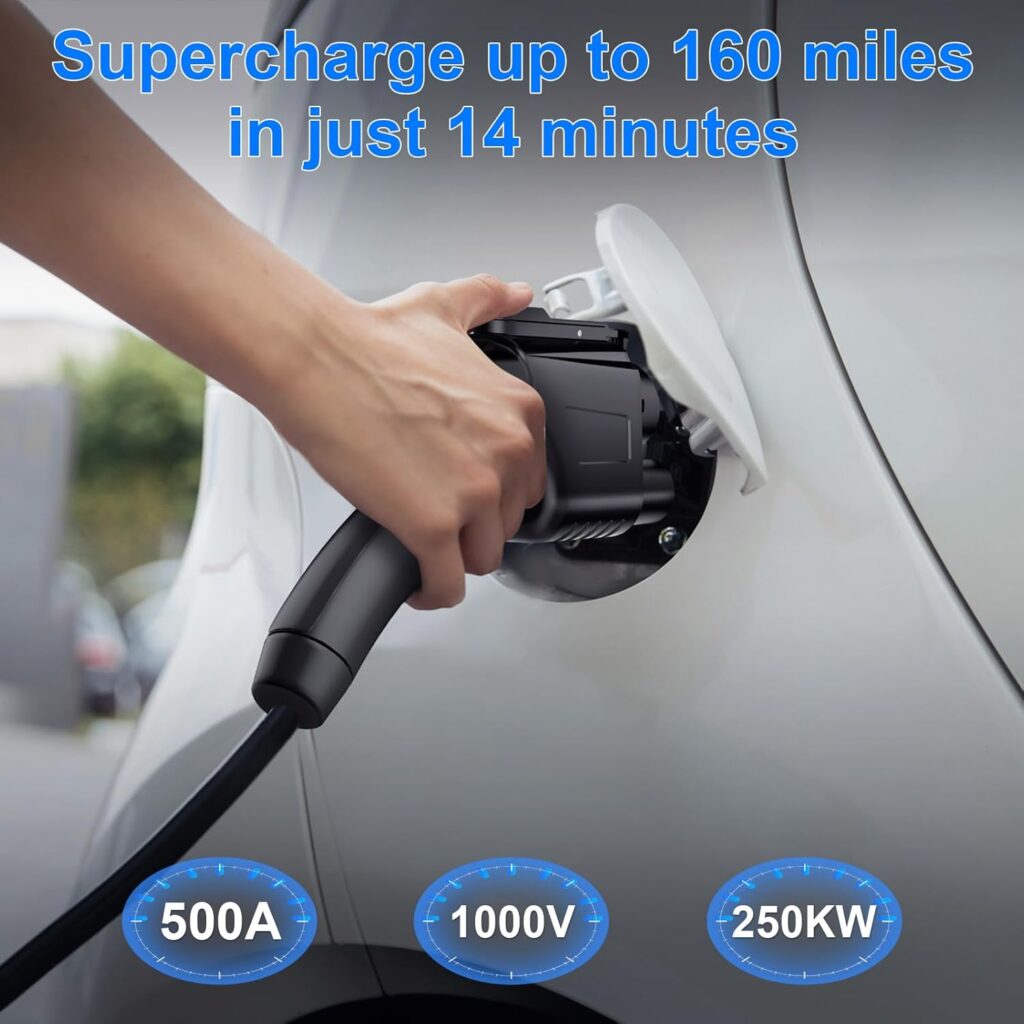
>>>>>Get Your Adapter Today<<<<<<
Power Output Ratings Explained
Against common misconceptions, power output ratings directly impact your charging times. When you select a charger, you’ll find ratings ranging from standard Level 1 (120V) to high-powered DC fast charging at 250kW, which can add up to 160 miles in just 14 minutes.
Real-World Performance Comparisons
| Charging Level | Range Added |
|---|---|
| DC Fast Charging | 160 miles/14 min |
| Level 2 Charging | 25 miles/hour |
| Feature | Benefit |
|---|---|
| Temperature Control | Auto shutdown at 122°F |
| Weather Protection | IP65 waterproof rating |
Performance testing reveals that modern chargers maintain consistent output levels across various weather conditions. Your charging experience is enhanced by advanced safety features, including thermal monitoring and automatic shutdown protocols, ensuring optimal charging conditions for your vehicle’s battery.
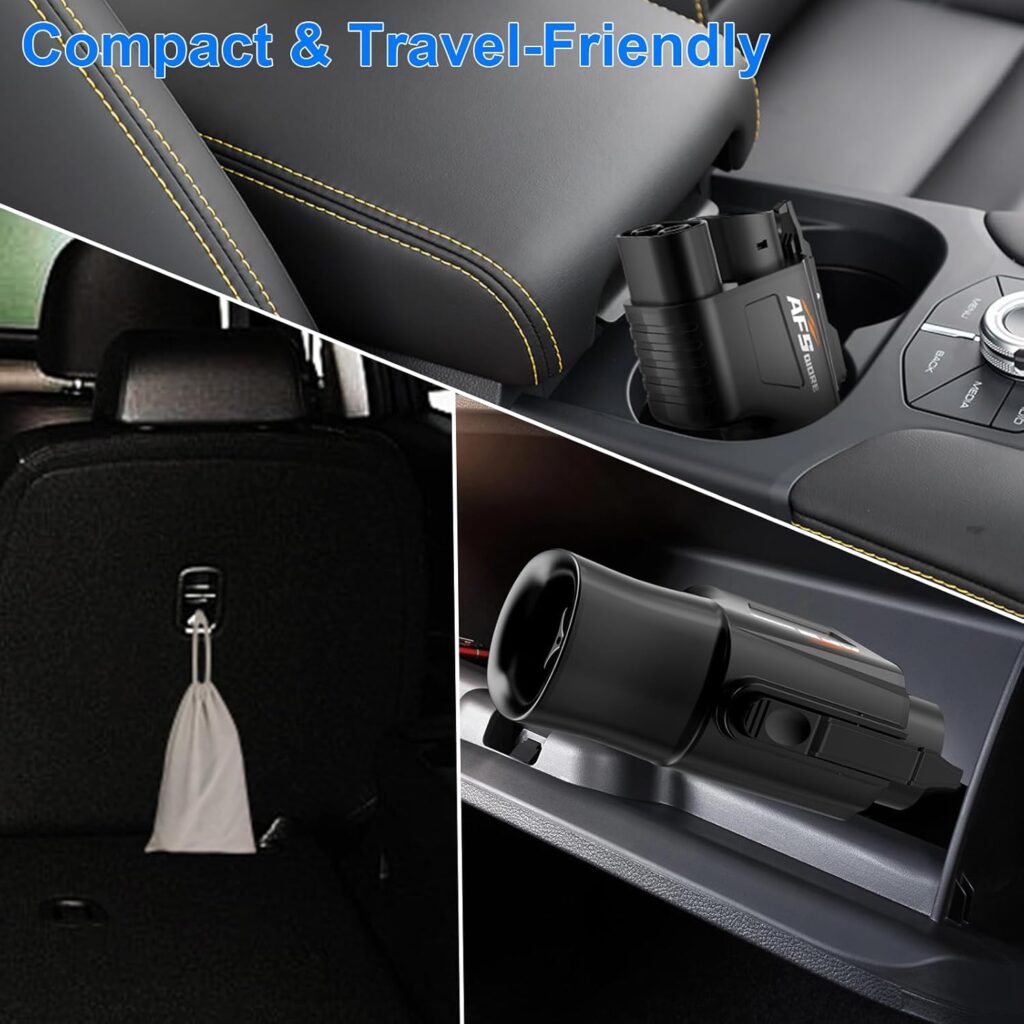
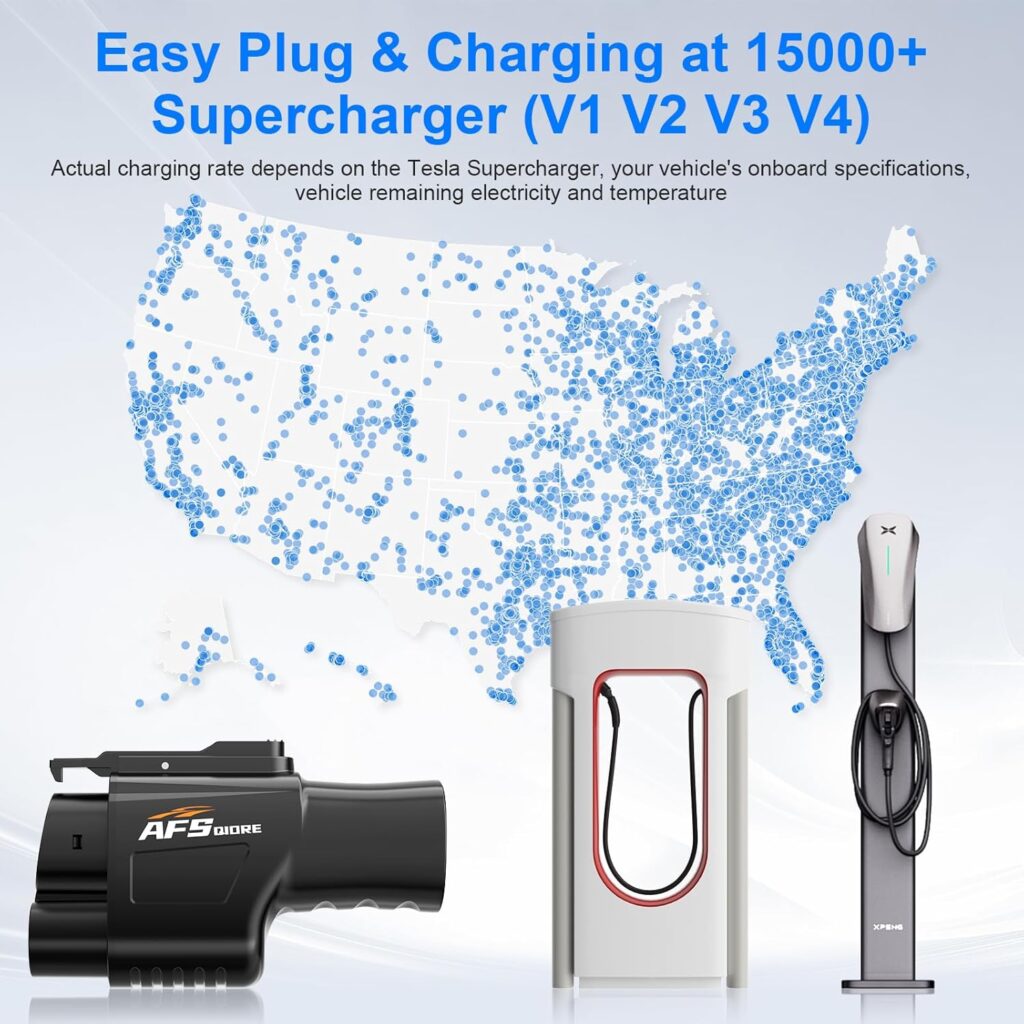
Safety Features and Certifications
Keep your charging experience secure with modern chargers that incorporate multiple layers of protection. Today’s standard chargers come equipped with temperature monitoring, overcurrent protection, and automatic shut-off mechanisms. You’ll find these features particularly important when charging at rates up to 250KW, where safety becomes paramount.
Importance of Safety Standards
Safety standards protect you and your vehicle from potential electrical hazards. When you’re dealing with high-power charging systems, standardization ensures consistent performance and reliability. Your charger must meet specific voltage tolerances and include fail-safe mechanisms to prevent damage to your vehicle’s battery system.
Common Certifications Explained
Against potential risks, manufacturers must obtain certifications like CE, FCC, and RoHS. These certifications verify that your charging equipment meets international safety requirements. Your charger should display these certifications clearly, indicating compliance with rigorous testing protocols.
Safety certifications include IP65 waterproofing for all-weather protection and UL62368-1 fire rating for thermal safety. Your charger undergoes over 20,000 mating tests to ensure durability and reliable performance. The temperature control system automatically derates or stops charging if temperatures exceed safe levels, typically at 122°F, protecting your investment.
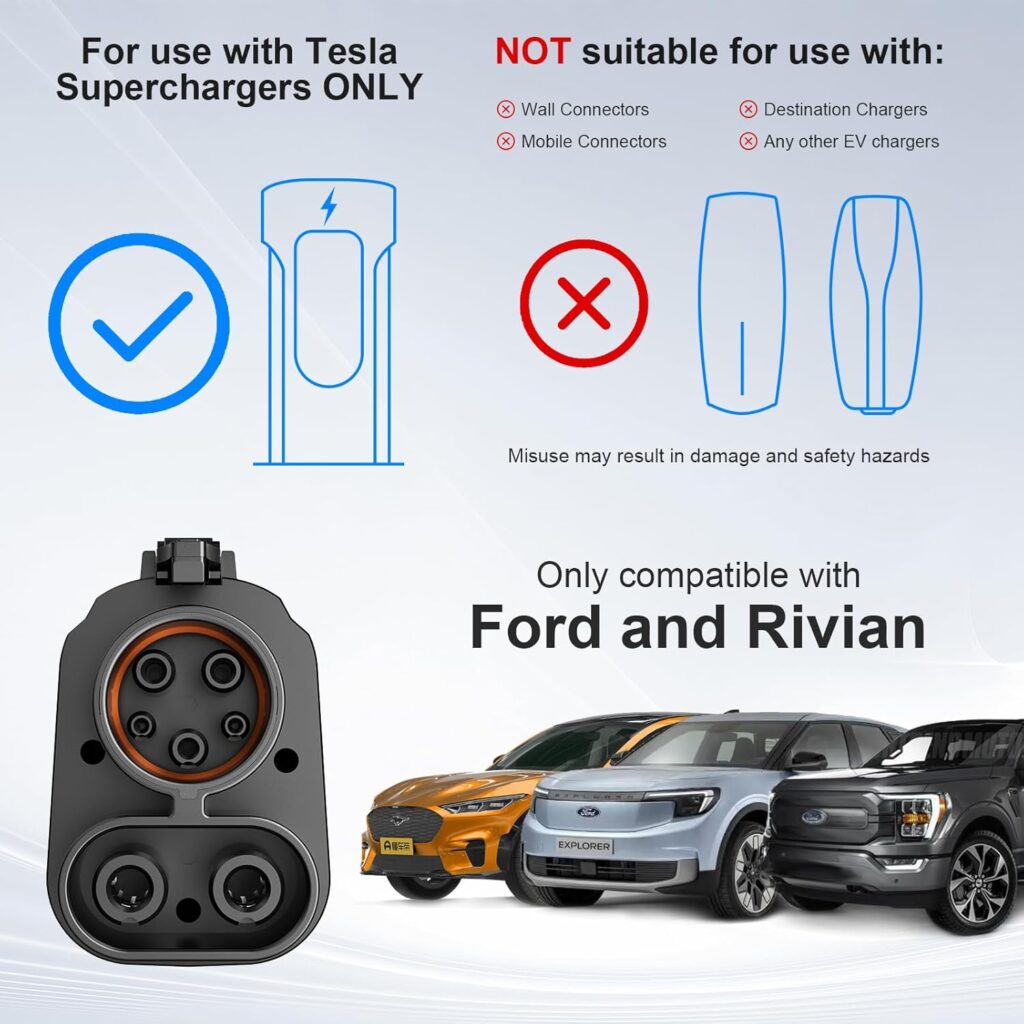
Compatibility with Devices
Despite the growing standardization of charging technologies, your charging options vary significantly across different EV brands. The adapter works with Ford Electric & Hybrid vehicles, Rivian Electric Vehicles, GM Electric Vehicles, and Volvo Polestar, but isn’t compatible with brands like Audi, BMW, or Toyota. This selective compatibility reflects the current fragmentation in EV charging standards.
Compatibility Issues with Older Devices
Among the most significant limitations you’ll encounter is the incompatibility with older EV models. Vehicles manufactured between 2012-2016, including the Ford Focus EV and Chevrolet Spark EV, cannot utilize this adapter. Your charging options for legacy vehicles remain limited to their original charging specifications.
Future-Proofing Your Charger Choice
Future-proofing your charging investment means selecting adapters that support charging rates up to 250 kW, allowing you to access over 15,000+ Tesla Supercharger stations. Your adapter should include advanced features like temperature control systems and IP65 waterproof ratings.
Due to rapid advancements in EV technology, your charging adapter needs to incorporate sophisticated safety features. The dual-sensor temperature control system protects your battery from overheating, while the CE, FCC, and RoHS certifications ensure compliance with current and emerging safety standards. You’ll benefit from the adapter’s capability to charge up to 160 miles in just 14 minutes, making it a practical long-term investment.
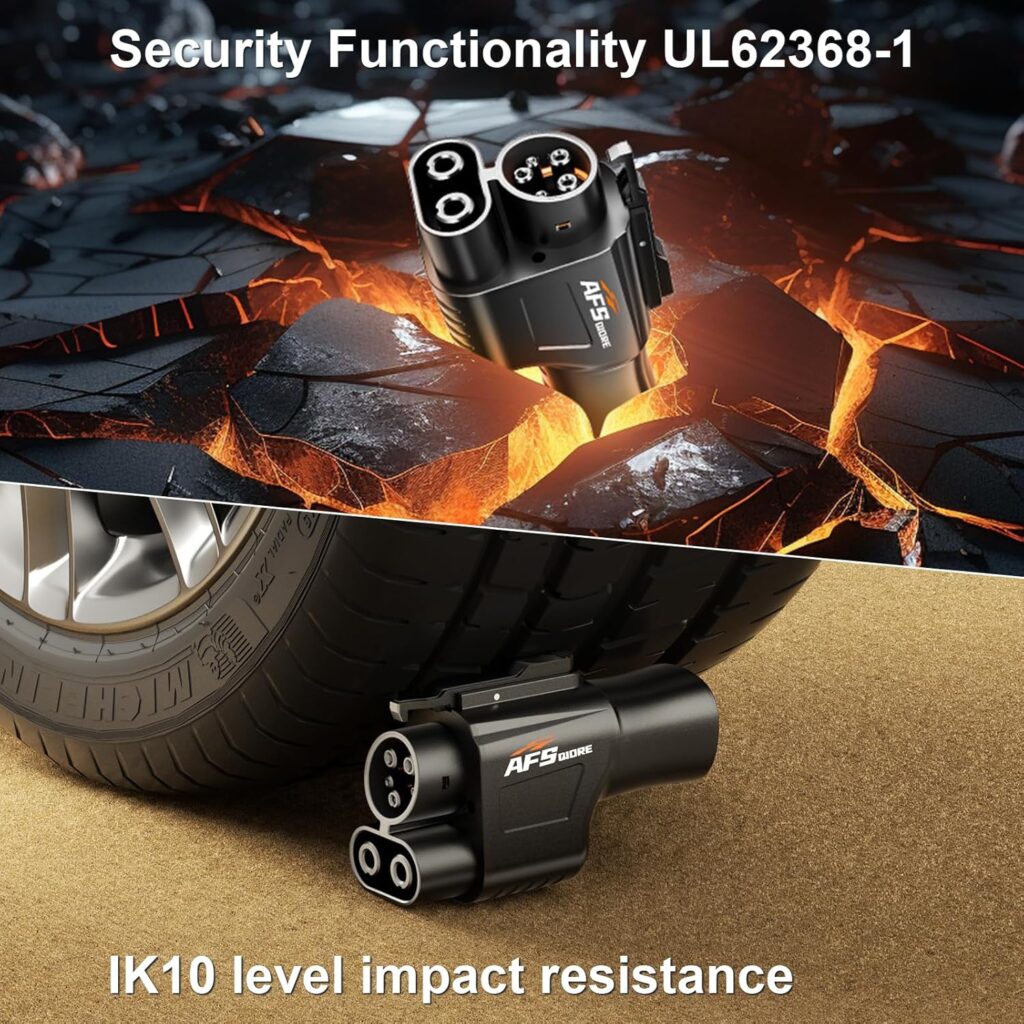
Environmental Impact of Chargers
Not all chargers are created equal when it comes to environmental impact. Your charging choices can make a significant difference, as modern chargers consume up to 90% less energy in standby mode compared to older models. The efficiency of your charger directly affects both your energy bills and carbon footprint.
Sustainability in Charger Manufacturing
Between various manufacturing processes, you’ll find significant differences in environmental impact. Modern chargers utilize up to 75% recycled materials in their production, reducing raw material demand. Your choice of manufacturer matters, as some companies have implemented zero-waste policies and renewable energy in their production facilities.
Recycling and Disposal Options
Around 85% of charger components can be recycled when properly disposed of. You can significantly reduce electronic waste by utilizing specialized recycling programs, as these chargers contain valuable materials like copper and rare earth elements that can be recovered and reused.
To maximize the environmental benefits of your charger recycling efforts, you should locate certified e-waste recycling centers in your area. These facilities can properly handle hazardous materials while recovering up to 95% of valuable components. Your local electronics retailers often provide collection points for old chargers, making responsible disposal convenient and accessible.
Summing up
Now, as you evaluate your charging options, this adapter emerges as a logical choice for compatible EV models, offering you access to Tesla’s extensive network of 15,000+ Superchargers. Your charging experience benefits from rates up to 250 KW, potentially adding 160 miles in just 14 minutes. The sophisticated temperature control system and robust safety features protect your investment, while the IP65 waterproof rating ensures reliable performance in diverse conditions. With the included storage bag and comprehensive warranty, you’re equipped for a seamless charging experience across your journeys.
>>>>>Learn More & Purchase<<<<<
